Choosing the right pickup truck for towing can be a daunting task, especially with the vast array of options available in the market. If you’re planning to haul a travel trailer, fifth wheel, boat, or any heavy load, selecting the Best Pickup Truck For Towing is crucial for safety and performance. This guide will delve into the essential factors to consider and help you navigate the process of finding the ideal tow vehicle for your needs.
Truck manufacturers are constantly innovating, and the market offers a diverse range of pickup trucks, each with unique towing capabilities. Staying informed about the latest models and features is key to making an informed decision. As brands evolve and introduce new generations of trucks, understanding these changes is vital. Automakers typically refresh their models every 4 to 7 years, introducing new platforms and overhauling existing designs. Keeping an open mind about different brands can significantly broaden your options and help you find the perfect truck that aligns with your towing requirements and budget.
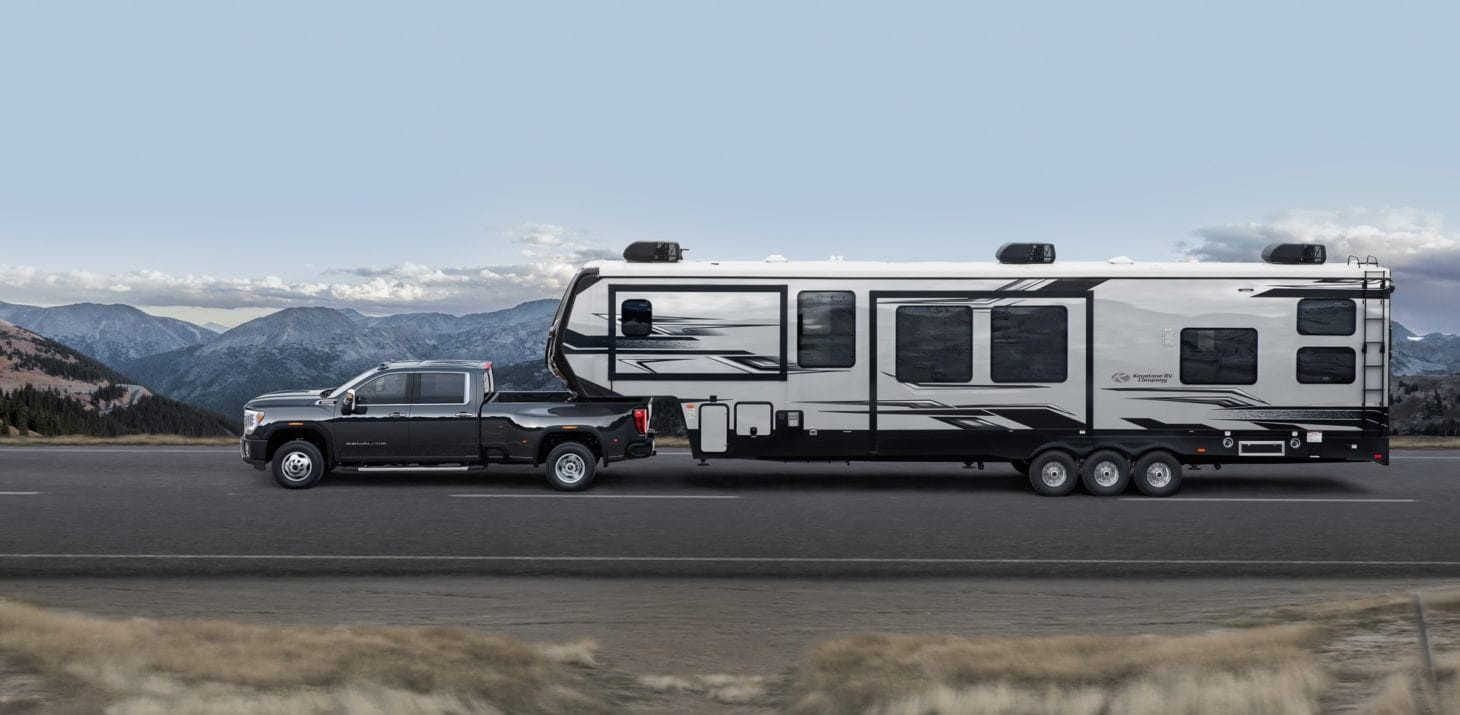 Truck towing fifth wheel travel trailer through mountains
Truck towing fifth wheel travel trailer through mountains
Understanding Towing Capacity and Payload: Key Metrics for Towing Trucks
When searching for the best pickup truck for towing, towing capacity and payload are paramount considerations. Towing capacity refers to the maximum weight a truck can safely pull, while payload is the maximum weight it can carry, including passengers, cargo, and tongue weight of the trailer. It’s essential to understand that these ratings can vary significantly even within the same truck model, depending on configurations and options.
Manufacturers often boast “Best in Class” towing figures, but it’s crucial to look beyond marketing hype and assess your specific needs. Luxury features and off-road enhancements, while desirable, can impact a truck’s towing and payload capacities. For example, opting for features like leather interiors, sunroofs, or specialized suspensions like those found in models like Chevy Trailboss, RAM Rebel, and Ford Raptor, can add weight and reduce payload capacity. Engine choice also plays a critical role. Smaller engines often offer better fuel economy but come with lower towing capacities compared to larger, more powerful engines.
To accurately determine a truck’s towing capacity, always refer to the driver’s side door jamb sticker. This sticker provides the specific payload capacity for that particular vehicle, a crucial number for safe towing. When comparing different trim levels or configurations of the same truck model at a dealership, you’ll notice variations in payload capacity.
Crucially, the towing capacity of your chosen truck must exceed the Gross Vehicle Weight Rating (GVWR) of your trailer. Remember to factor in the weight of passengers and cargo in the truck, as this contributes to the Gross Vehicle Weight (GVW) and affects the overall GVWR. For precise measurements, consider visiting a truck scale to ascertain your GVW and compare it against the truck’s GVWR.
Payload capacity is equally important, representing the total weight a truck can carry in its cabin and bed, including passengers, cargo, and the trailer’s tongue weight. Overloading payload is a common mistake, particularly with RV towing, as RVs tend to have heavier tongue weights than other types of trailers. Exceeding payload capacity can lead to truck “sag,” where the rear suspension is compressed, the truck’s nose rises, and steering becomes less responsive, creating a dangerous towing situation.
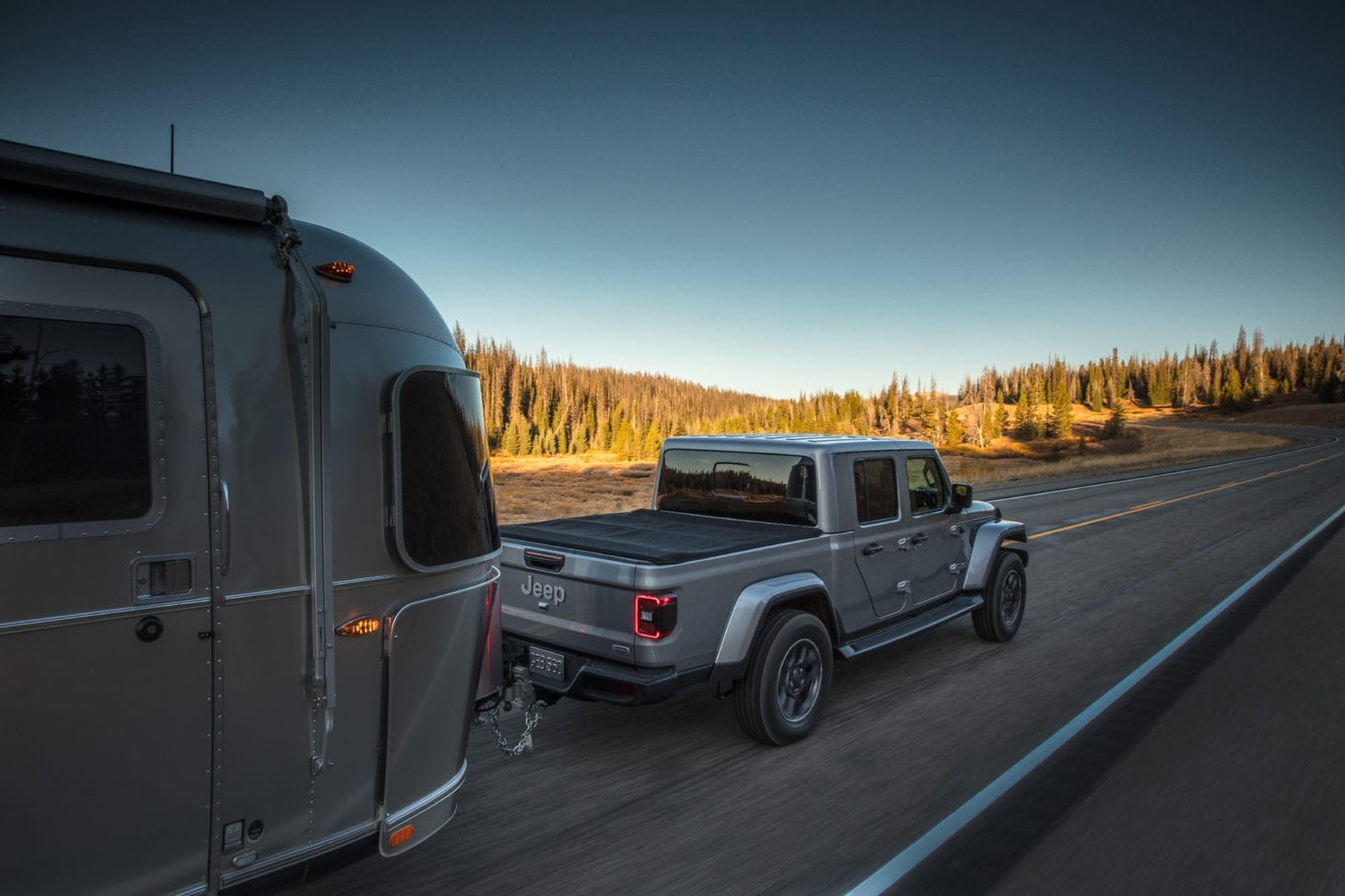 Truck towing an Airstream travel trailer on road
Truck towing an Airstream travel trailer on road
Fifth Wheel Towing Considerations: Matching Trucks to Heavy Loads
Towing a fifth wheel trailer presents unique demands due to their significant weight. Therefore, selecting the best pickup truck for towing fifth wheels requires careful consideration of hitch weight and overall tow weight. Fifth wheels typically necessitate trucks with higher payload and towing capacities compared to conventional travel trailers.
When shopping for a truck specifically for fifth wheel towing, prioritizing models with factory-installed fifth wheel prep packages is advisable. These packages often include additional features optimized for camper towing. However, if you find a truck that meets your preferences but lacks factory fifth wheel prep, aftermarket solutions are available to facilitate fifth wheel hookups to the truck bed.
Payload capacity is especially critical for fifth wheel towing because a substantial portion of the trailer’s weight is transferred directly to the truck’s bed. This weight distribution often necessitates upgrading from a three-quarter-ton to a one-ton truck. For instance, a 2500 HD truck might be insufficient if the fifth wheel’s pin weight, combined with passengers and cargo, exceeds the typical 3,000-pound payload limit of a 2500. In contrast, a 3500 truck generally handles payloads of 4,000 pounds and above, offering a more suitable option for heavier fifth wheels.
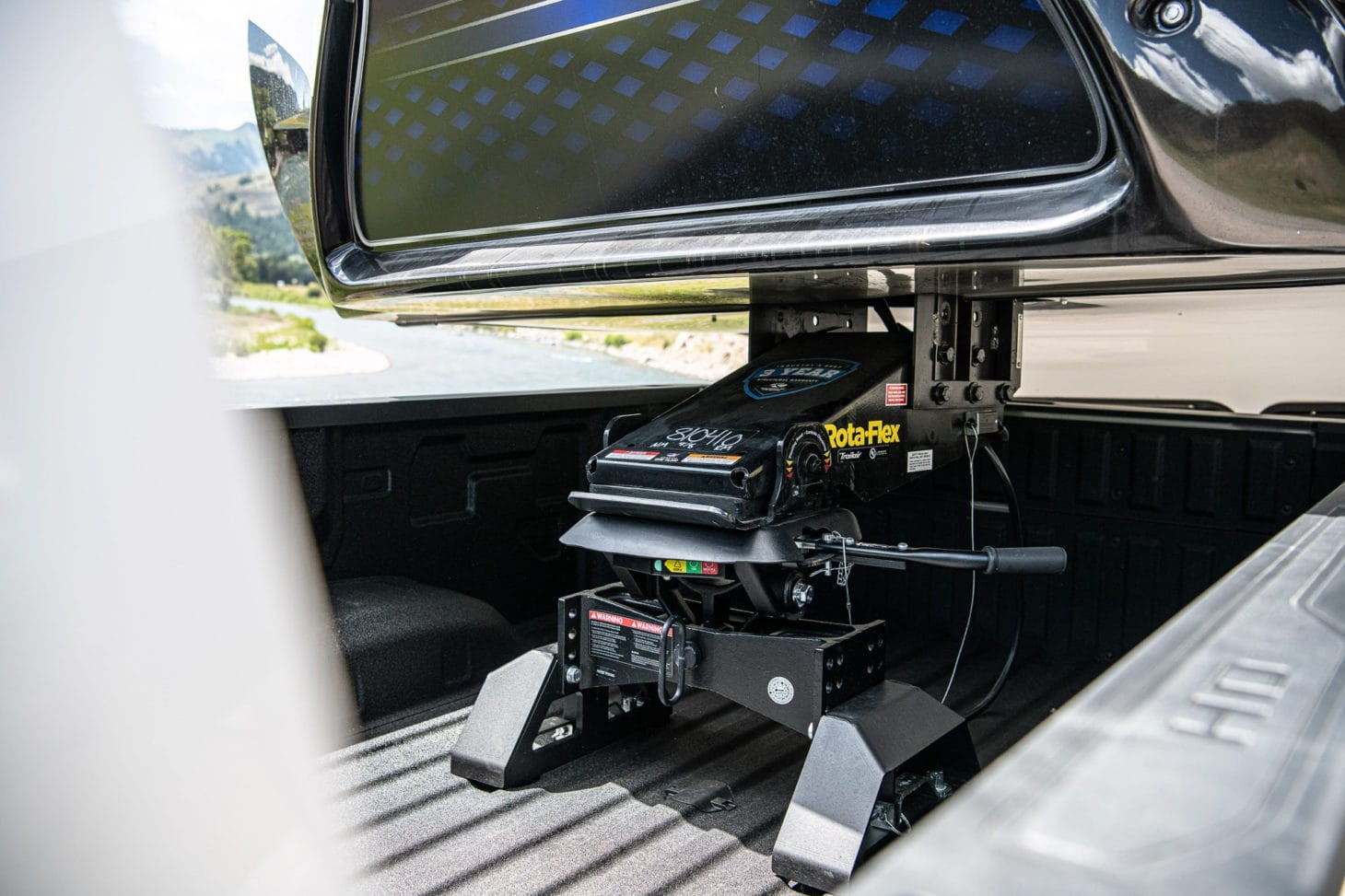 Close up of a fifth wheel hitched to a truck bed
Close up of a fifth wheel hitched to a truck bed
Top Pickup Trucks for Towing: Segment-Wise Recommendations
The best pickup truck for towing isn’t a one-size-fits-all answer. It depends on the weight and type of load you intend to tow. Factors like engine power, transmission, cooling system, brakes, axles, and suspension all contribute to a truck’s towing prowess. It’s crucial to meticulously review truck specifications, as engine type, gearing, cab and bed styles, and towing packages significantly influence towing capacity. A RAM 3500, for example, can tow upwards of 37,000 pounds when properly configured, but this figure can drastically decrease without the right options.
Here’s a segment-wise look at some of the best trucks for towing, categorized by size and towing capacity:
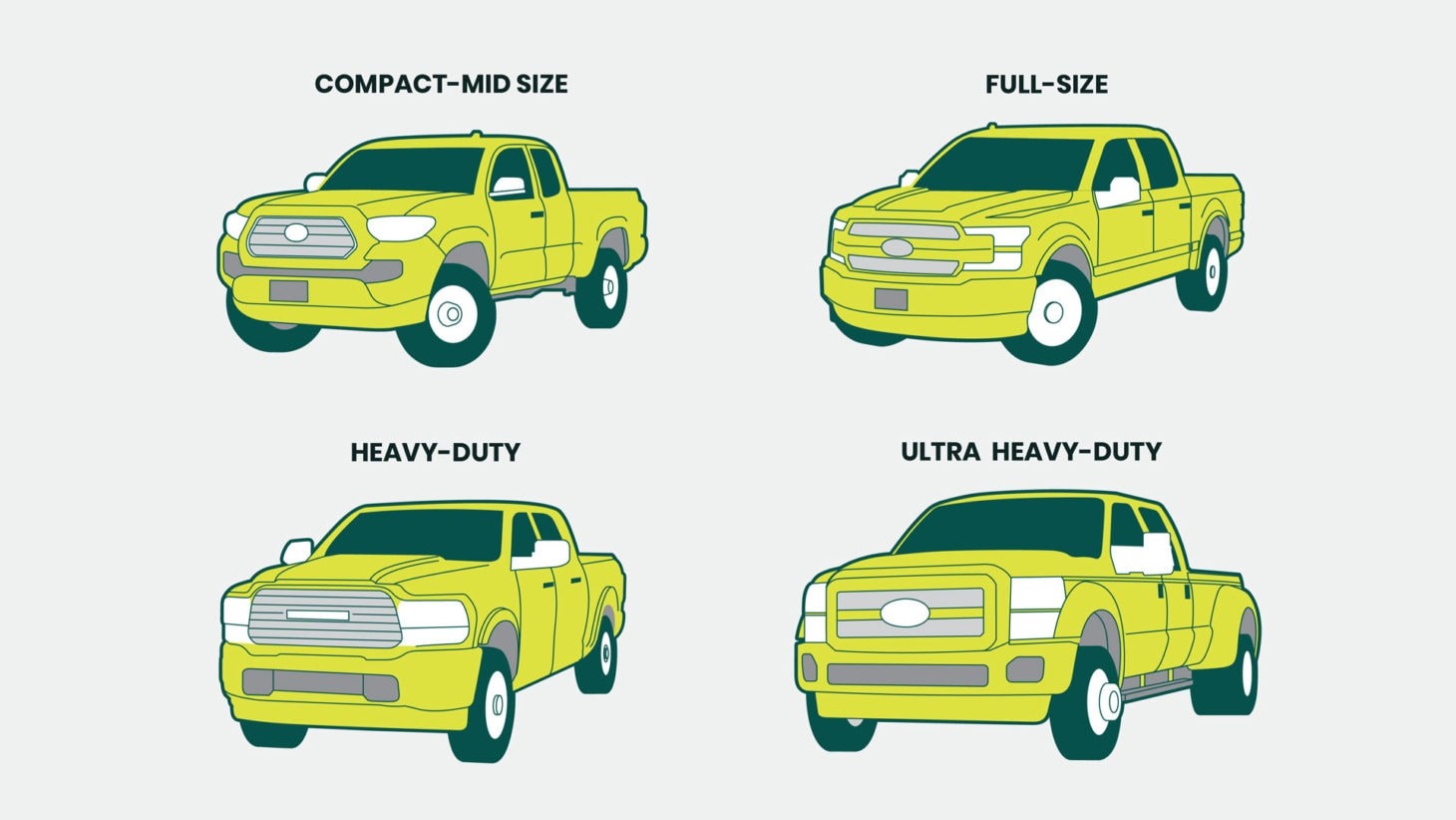 Illustrations of pickup trucks of various sizes
Illustrations of pickup trucks of various sizes
Mid-Size/Compact Trucks: Capable for Lighter Loads
For weekend adventurers towing smaller campers, boats, or motorcycles, mid-size trucks offer a blend of capability and maneuverability. Their towing capacities typically range from 5,000 to 7,700 pounds.
- Chevrolet Colorado / GMC Canyon: Max towing up to 7,700 lbs.
- Jeep Gladiator: Max towing up to 7,700 lbs (with Max Tow Package).
- Ford Ranger: Max towing up to 7,500 lbs.
- Toyota Tacoma: Max towing up to 6,800 lbs.
- Nissan Frontier: Max towing up to 6,640 lbs.
- Honda Ridgeline: Max towing up to 5,000 lbs.
Full-Size Trucks (Half-Ton): Versatile Towing Options
Full-size or half-ton trucks provide a significant step up in towing capacity, suitable for larger travel trailers and boats. Towing capacities in this segment range from approximately 9,740 to 13,200 pounds.
- Chevrolet Silverado / GMC Sierra 1500: Max towing up to 13,400 lbs.
- Ford F-150: Max towing up to 13,200 lbs.
- RAM 1500: Max towing up to 12,750 lbs.
- Toyota Tundra: Max towing up to 10,200 lbs.
- Nissan Titan: Max towing up to 9,370 lbs.
Heavy-Duty Trucks (Three-Quarter-Ton): For Larger Trailers
Heavy-duty trucks are designed for substantial towing tasks, ideal for larger fifth wheels and long travel trailers. They often feature gooseneck and fifth-wheel hitch options for enhanced towing stability.
- Chevrolet Silverado / GMC Sierra 2500: Max fifth-wheel towing up to 31,180 lbs.
- Ford Super Duty F-250: Max fifth-wheel towing up to 22,800 lbs.
- RAM 2500: Max fifth-wheel towing up to 19,680 lbs.
- Nissan Titan XD: Max fifth-wheel towing up to 11,040 lbs.
Ultra-Duty Trucks (One-Ton and Above): The Heavy Haulers
Ultra-duty trucks represent the pinnacle of towing capability, designed for the largest fifth wheels and heaviest loads. Their towing capacities range from 20,000 to over 38,000 pounds. These trucks are available in single rear wheel (SRW) and dual rear wheel (DRW) configurations, with DRW models offering superior stability and higher towing capacities.
- Ford Super Duty F-350: Max fifth-wheel towing up to 38,000 lbs. (DRW model).
- RAM 3500: Max fifth-wheel towing up to 37,090 lbs. (DRW model).
- Chevrolet Silverado / GMC Sierra 3500: Max fifth-wheel towing up to 36,000 lbs. (DRW model).
Key Features to Look for in a Towing Pickup Truck
Beyond towing capacity, several features enhance the towing experience and safety. When selecting the best pickup truck for towing, consider the following:
Gas vs. Diesel Engines: Torque and Efficiency
Diesel engines are favored for towing due to their superior low-end torque, which translates to powerful pulling capability. They often offer a better balance of fuel economy and towing performance, especially for frequent towing. While traditionally found in heavy-duty trucks, diesel options are now available in some mid-size and full-size models like Chevrolet Colorado, GMC Canyon, Jeep Gladiator, Ford F-150, and RAM 1500.
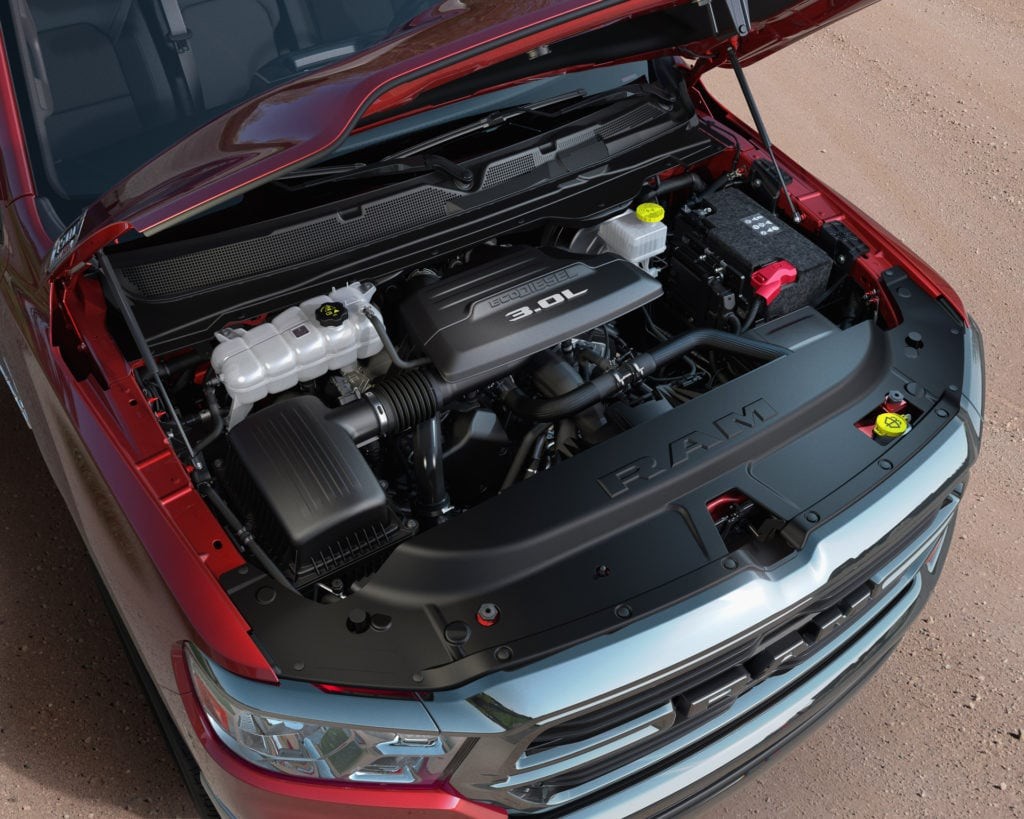 Open hood of a pickup truck with an eco diesel engine
Open hood of a pickup truck with an eco diesel engine
Pros of Diesel Trucks for Towing:
- Higher towing capacity and enhanced towing experience.
- Engine braking for safer downhill towing.
- Better fuel economy and range while towing.
- Durability and longevity.
- Higher resale value.
- Strong torque for driving enjoyment.
Cons of Diesel Trucks:
- Higher initial purchase price.
- Limited fuel availability (diesel fuel stations).
- Diesel Exhaust Fluid (DEF) requirement.
- Higher fuel and maintenance costs.
- Increased engine weight, potentially reducing payload.
For occasional towing, a gas engine might suffice, offering lower upfront costs and simpler maintenance. However, for frequent or heavy towing, diesel engines generally provide superior performance and longevity.
Four-Wheel Drive: Traction and Control
Consider whether four-wheel drive (4WD) is necessary for your towing needs. Most pickups are rear-wheel drive (RWD) by default, designed for hauling heavy loads. 4WD systems offer enhanced traction, particularly beneficial in challenging conditions like off-road terrains, snow, or gravel. Part-time 4WD systems engage when needed, while full-time systems offer continuous traction enhancement.
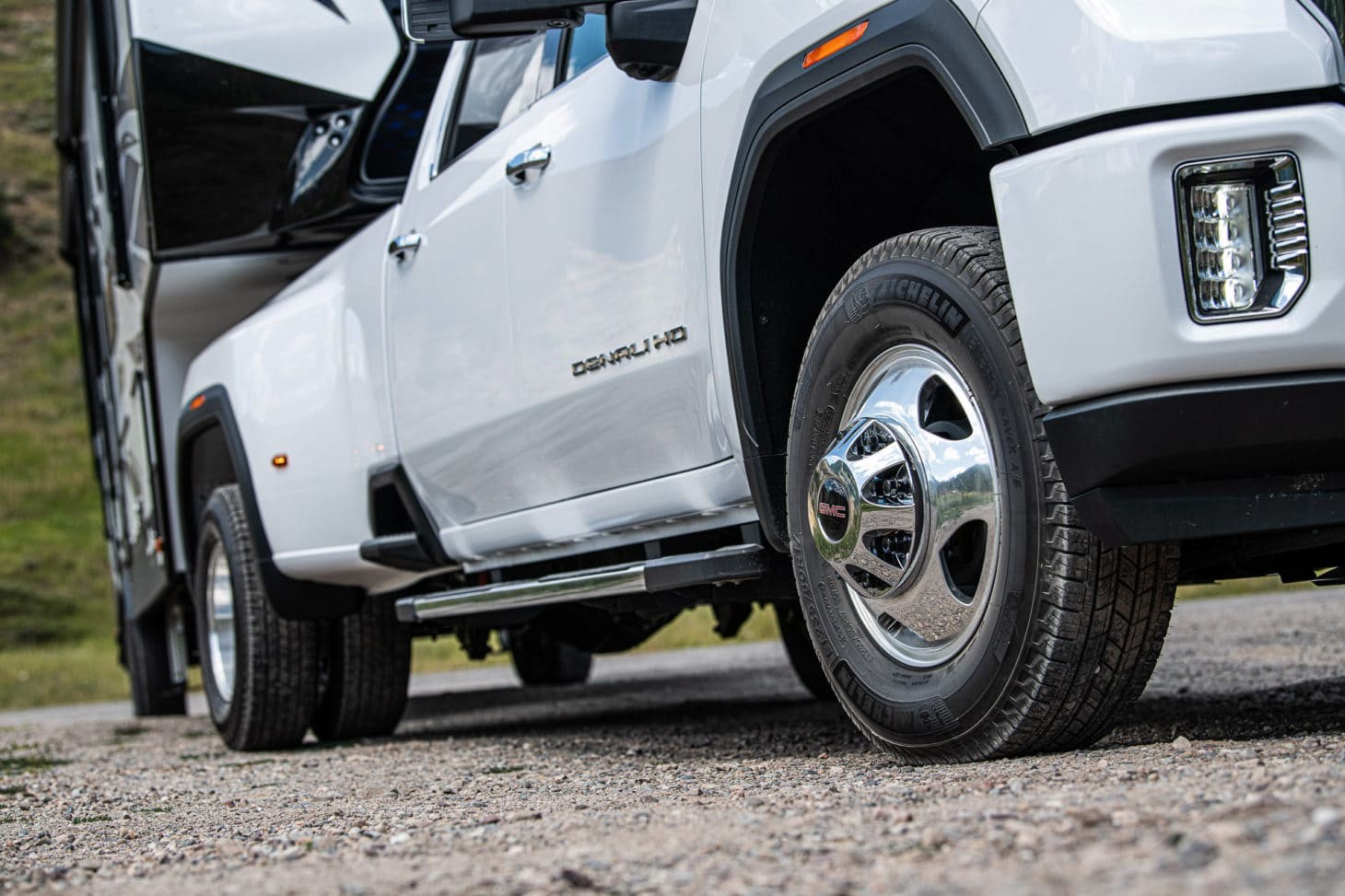 Close up of wheels on a pickup truck towing a travel trailer
Close up of wheels on a pickup truck towing a travel trailer
Trade-offs of 4WD:
- Increased vehicle weight due to 4WD components.
- Slightly reduced towing capacity and fuel efficiency compared to 2WD models.
For off-road adventures or towing in inclement weather, 4WD is a valuable asset. Models like Ford Raptor, Chevy Silverado Trailboss, RAM Rebel, Toyota TRD Pro, and Jeep Gladiator Rubicon offer enhanced off-road capabilities but may have slightly lower payload and towing ratings due to their specialized suspensions.
Cab and Bed Types: Space and Practicality
Pickup trucks come in various cab configurations: regular cab (two-door), extended cab (three-door), and crew cab (four-door). Regular cabs offer lower cost and lighter weight, maximizing payload but sacrificing passenger space. Extended cabs provide some rear seating, suitable for children or occasional adult passengers. Crew cabs offer ample passenger space, comparable to SUVs, but often come with shorter beds and potentially reduced payload.
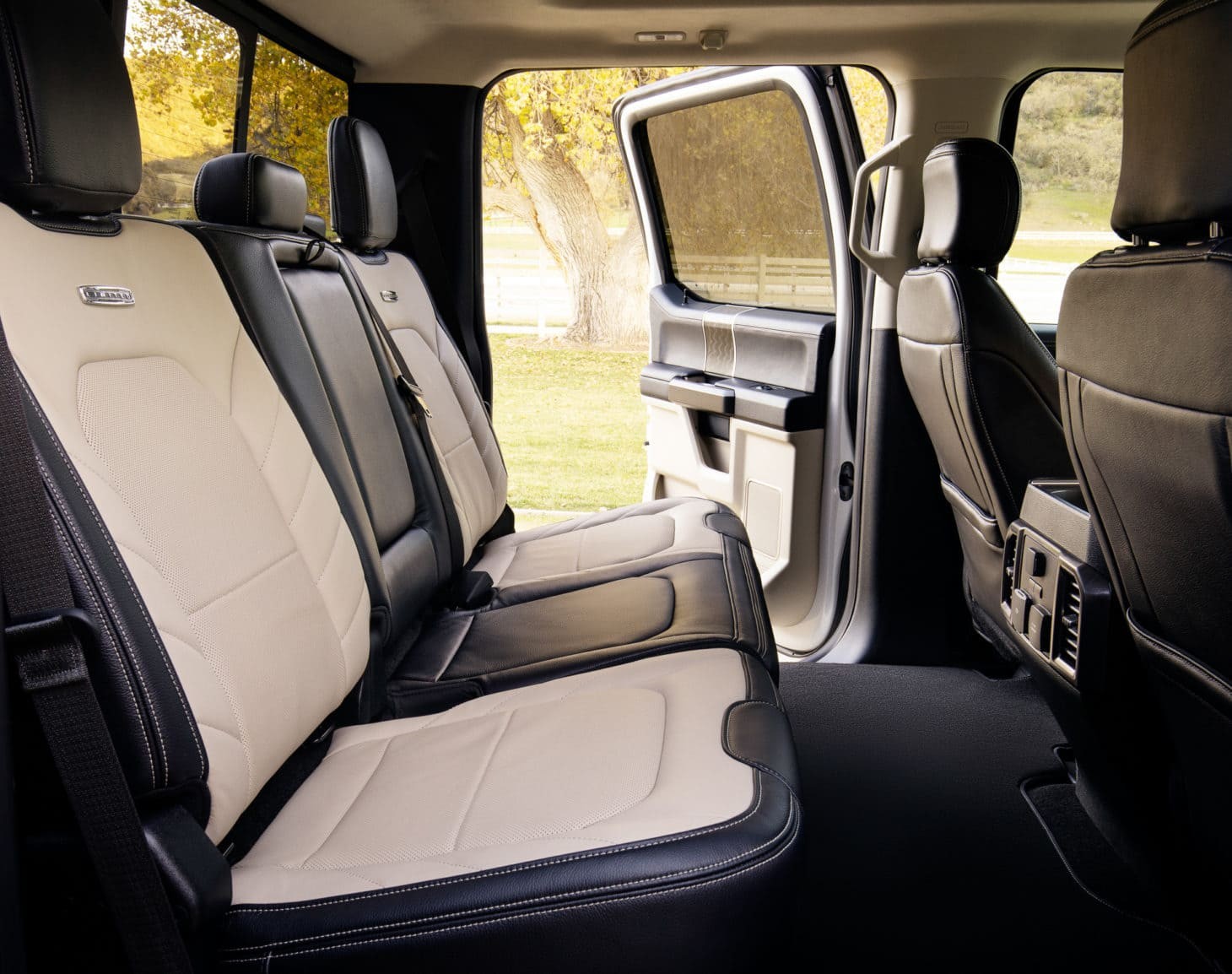 Interior cab of a pickup truck with leather seats and leg room
Interior cab of a pickup truck with leather seats and leg room
Truck bed lengths also vary. Short beds improve maneuverability and parking, while long beds offer more cargo space and a longer wheelbase, enhancing towing stability. Long beds are generally preferred for towing, especially for fifth wheels. Standard bed lengths are typically 8 feet for full-size pickups, 6 feet for extended cabs, and 5 feet for crew cabs. For fifth wheel towing, short beds are generally not recommended due to potential cab clearance issues.
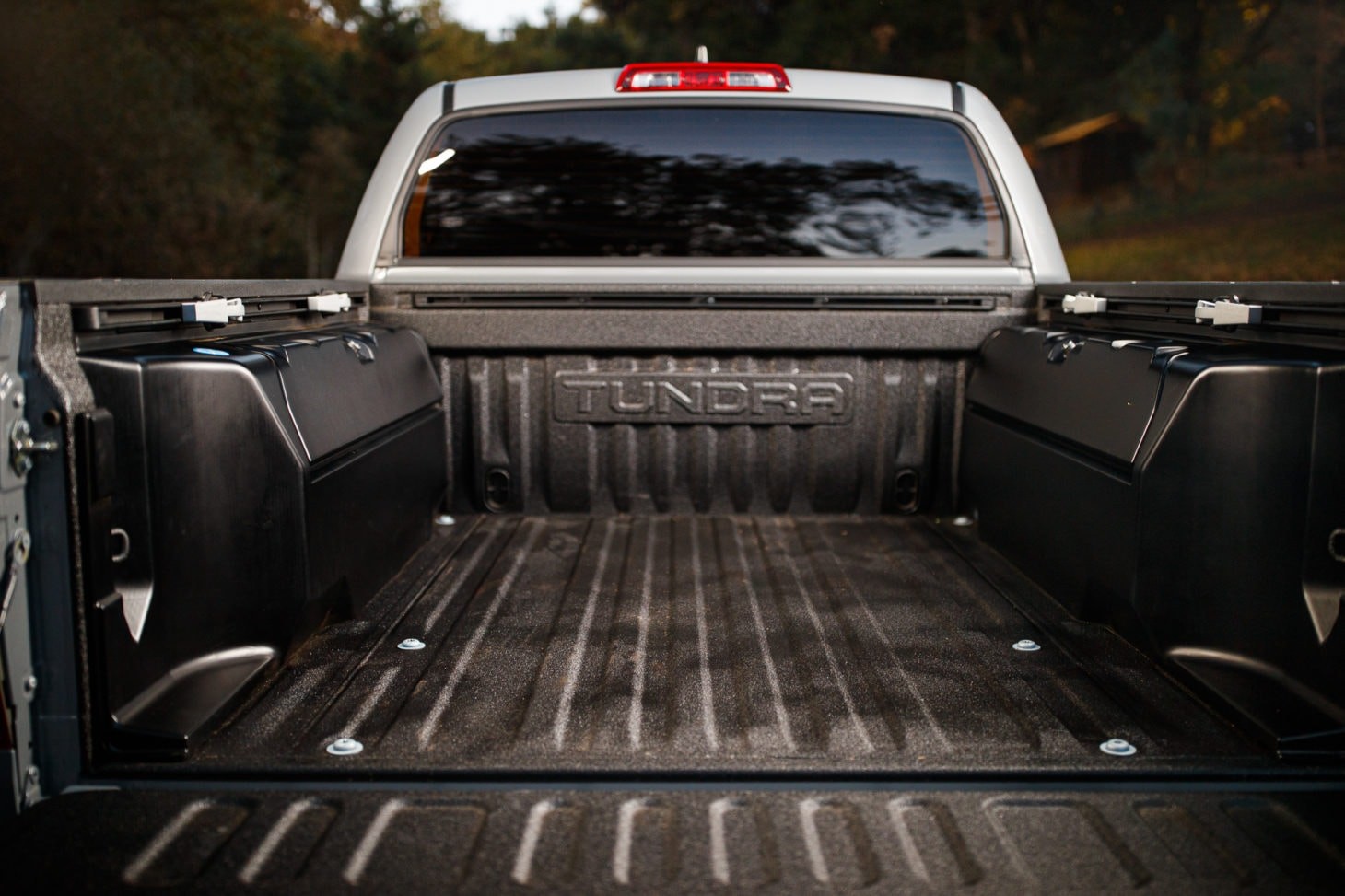 View of an empty truck bed
View of an empty truck bed
Advanced Towing Features: Safety and Convenience
Modern pickup trucks offer a range of advanced features that enhance towing safety and convenience:
- Trailer Brake Controller: Integrates trailer brakes with the truck’s braking system for smoother and safer stops.
- Blind Spot Monitoring: Extends blind spot monitoring to include the trailer, alerting drivers to vehicles alongside the trailer.
- Cameras: Multi-camera systems provide comprehensive views around the truck and trailer, aiding in hitching, maneuvering, and monitoring cargo. Some systems even integrate with trailer cameras for rear views.
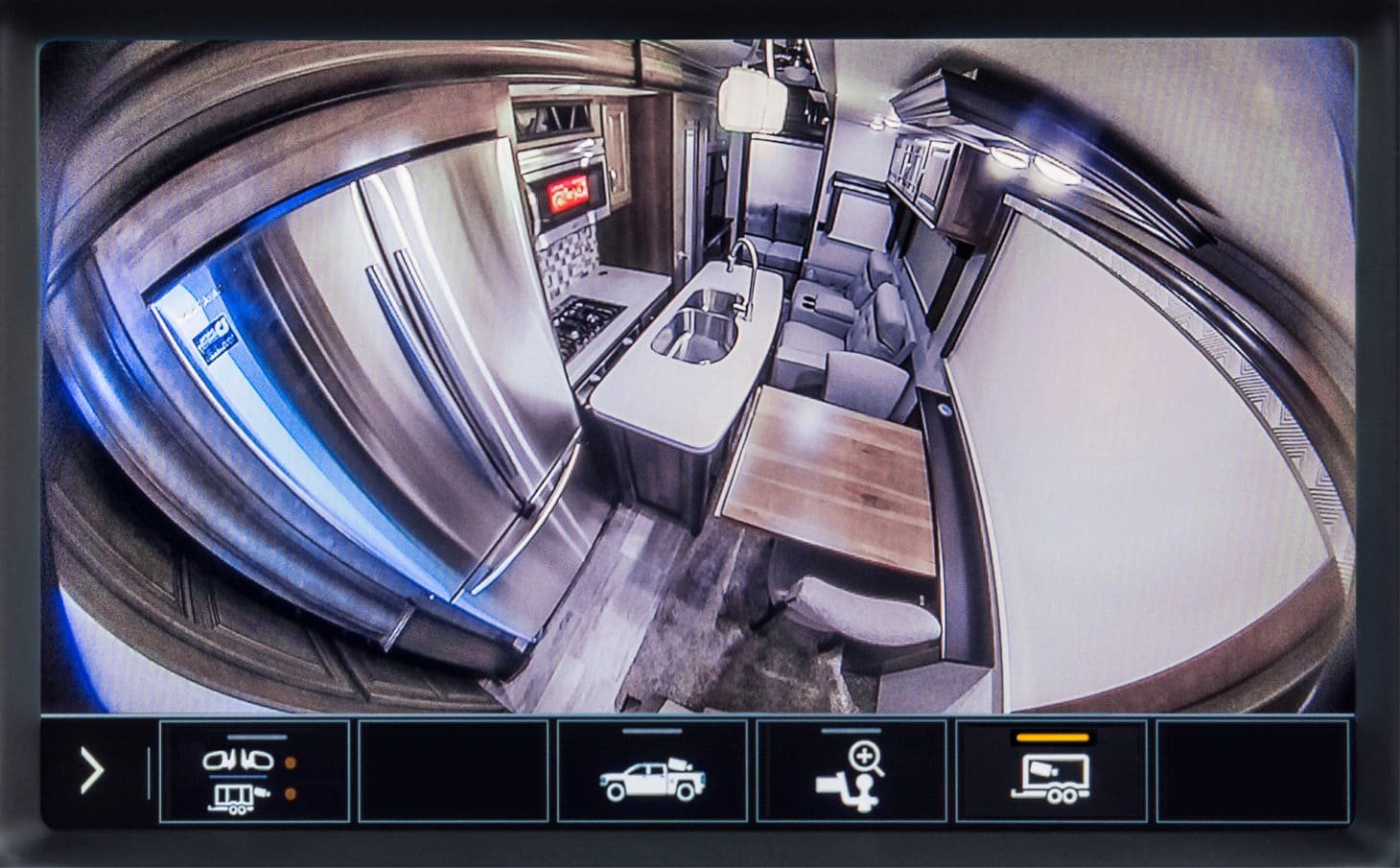 View of camera in pickup truck of attached travel trailer interior
View of camera in pickup truck of attached travel trailer interior
- Remote Trailer Light Check: Allows for easy verification of trailer light functionality via a key fob.
- Trailer Backup Assist: Simplifies trailer reversing with automated steering inputs.
- Trailer Sway Control: Stability systems that automatically counteract trailer sway for safer towing.
- Trailer Tire Pressure Monitoring System: Monitors trailer tire pressure and temperature, preventing blowouts.
Final Steps in Choosing Your Best Towing Truck
Once you’ve narrowed down your choices based on size, features, and towing capacity, delve into owner reviews and forums for real-world feedback on towing performance and reliability. Consider the time of year for potential dealer incentives and sales. Remember that dealership salespeople may not always be the most informed source for specific towing inquiries, so prioritize your research and focus on your individual towing needs and lifestyle.
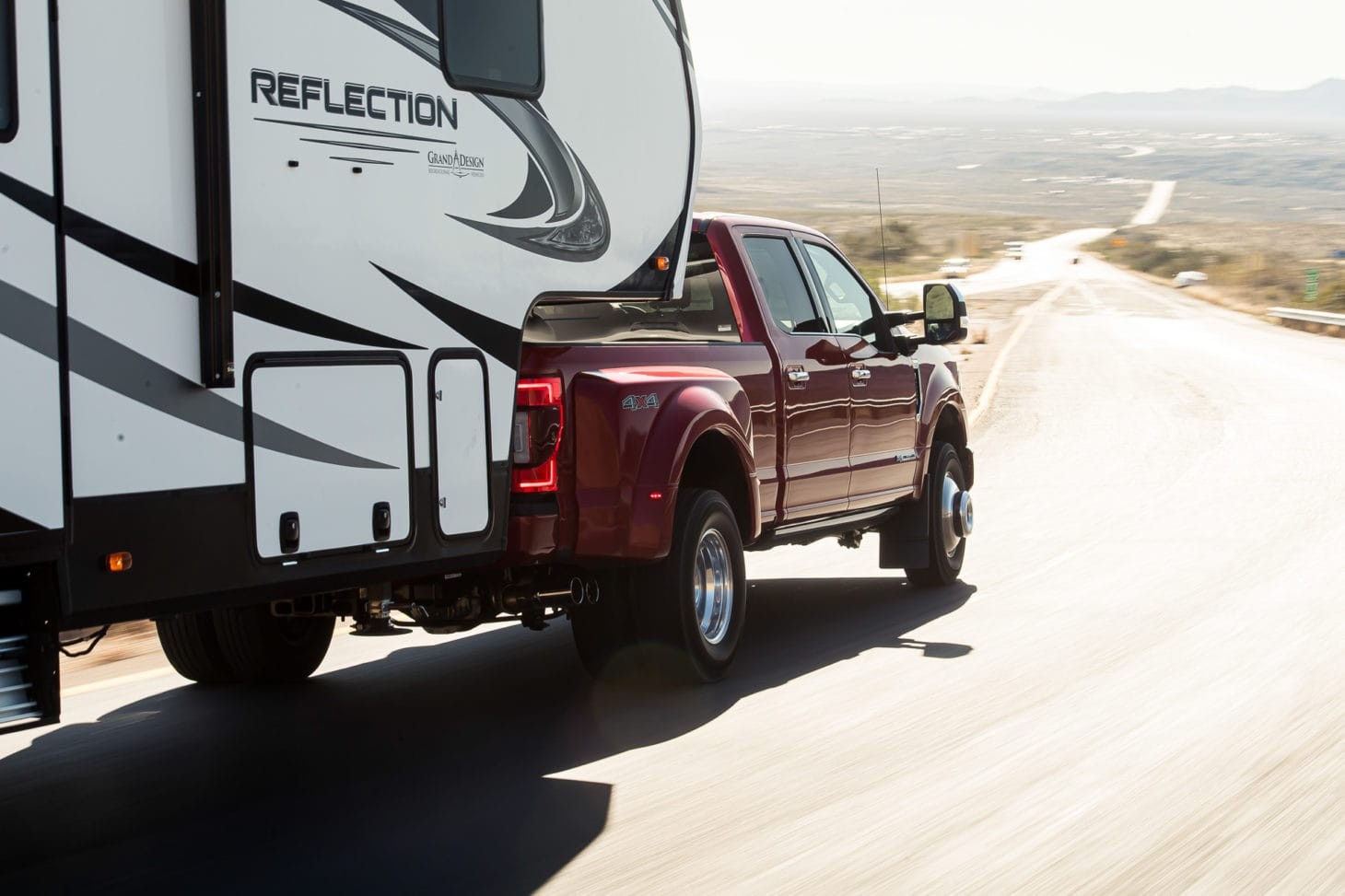 Heavy duty pickup truck towing a fifth wheel driving on road
Heavy duty pickup truck towing a fifth wheel driving on road
By arming yourself with the right knowledge and understanding your towing requirements, you can confidently navigate the truck market and select the best pickup truck for towing that perfectly matches your needs and ensures safe and enjoyable journeys.
